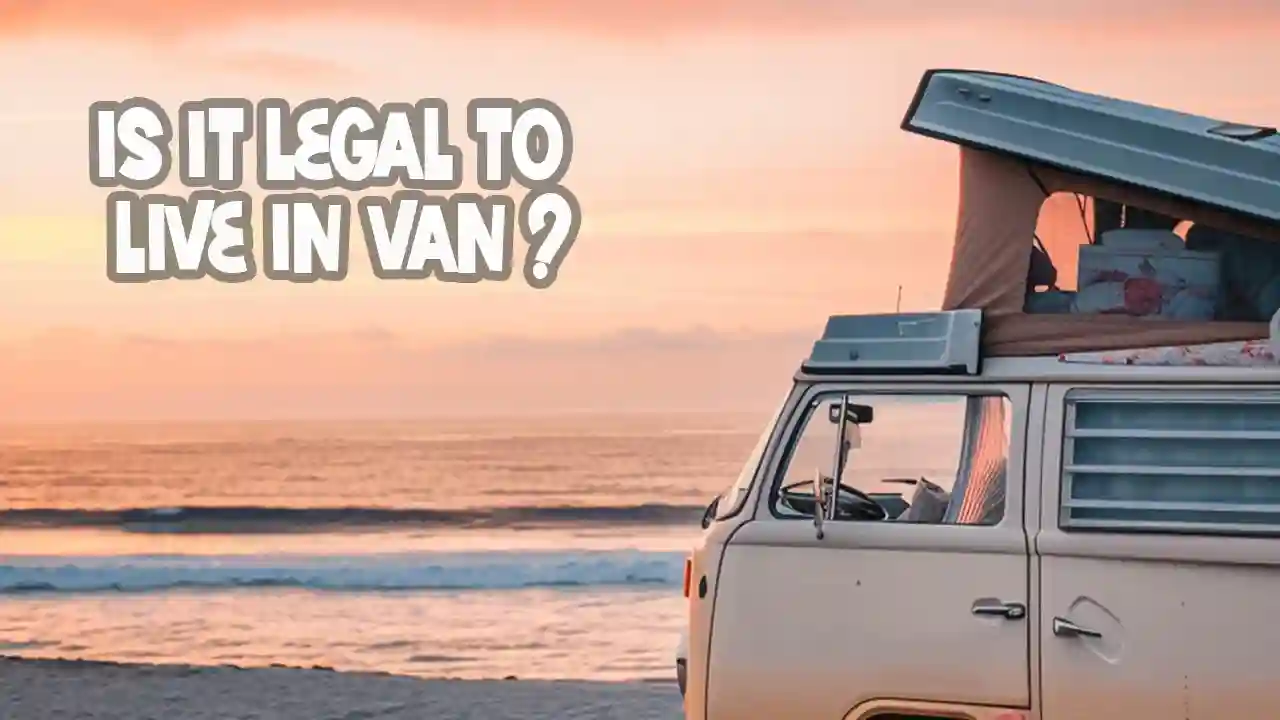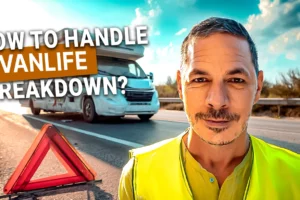
Is It Legal to Live in a Van?
Introduction
Hi friends! Today, I wanted to share some information about van life, since many of you probably have questions about what’s legal and what’s not.
So, in this article, we’ll look at what the law says about living year-round in your van, how to handle paperwork and insurance, and a few tips for traveling well too. Let’s get started; I hope you find this useful!
Personal and Professional Address
It’s crucial to have a fixed address, even if you live a nomadic lifestyle. A registered address is essential for administrative tasks, voting, insurance, and banking.
Address Options
- Using a relative’s address: This is the simplest option but may not be ideal. Consider your circumstances.
- PO Box: Services like the Post Office or specialized organizations offer this. It’s convenient but comes with costs.
- Dedicated associations: Some associations provide addresses for those without a permanent home. Worth exploring.
If you plan to work during your nomadic life, which we recommend for extending your adventure, you’ll also need to register your business address. This is even more crucial!
In the United States
In the U.S., you’ll need a permanent address for tax purposes and administrative needs. Using a family member’s address or a mail forwarding service can help. Ensure all documents, like your driver’s license, vehicle registration, and insurance, are updated with this address.
In the United Kingdom
In the UK, you must have a permanent address for legal and administrative reasons. This could be a relative’s address, a PO Box, or a service providing addresses for those without permanent homes. Keep all documents, such as your driving license, vehicle tax, MOT, and insurance, current and registered to this address.

Registering a Converted Van
This is particularly relevant for those who convert their own vehicles. If you buy a pre-converted van or camper, it likely already meets necessary registration requirements, but this isn’t always guaranteed for all vehicle types.
Why is it Important?
Why bother with this registration? First, it clarifies the nature of your vehicle for legal and insurance purposes. An unregistered converted van poses a significant risk during inspections. Additionally, it simplifies insurance and technical inspections since your vehicle is clearly identified for what it is.
How to Obtain It in the U.S.
In the United States, re-titling your van as an RV helps insurance companies provide proper coverage. The process varies by state, but generally involves:
– Getting a VIN inspection.
– Providing ownership proof, weight slips, and a statement of installed features such as cooking facilities, a toilet, and a water supply system.
After reclassification, obtaining proper RV insurance is crucial to ensure your vehicle is recognized by the DMV and insurance companies.
How to Obtain It in the UK
In the United Kingdom, the DVLA requires specific features for a vehicle to be reclassified as a motor caravan:
– External features like windows, a separate door, motor caravan-style graphics, and a high-top roof.
– Internal features including seats and a table, sleeping accommodation, cooking facilities, and storage.
Submit a completed motor caravan conversion checklist, photos of these features, and your V5C registration certificate to the DVLA for approval.
Advantages
- Legal Clarity: With proper registration, there’s no gray area—you’re fully compliant.
- Insurance Suitability: Easier to find appropriate insurance, as insurers know exactly what they’re covering.
- Technical Inspections: Simplifies inspections as your vehicle is recognized as a mobile home.
- Border Crossing: Easier to cross borders, as your van is classified as a motorhome.
- Tax Benefits: May reduce certain taxes, offering potential savings.
Insurance and Vehicle Inspection
After choosing and converting your trusty travel companion, and if you plan to live in your van, it’s crucial to ensure everything is in order administratively. Here are some tips regarding insurance and vehicle inspection for your van.
Insurance Specifics for a Converted Van
Let’s start with insurance. If you have a converted van, the insurance will differ from that of a standard car. Why? Because your van is not just a mode of transport; it’s your home. If your van is properly registered, you can get specialized RV or motorhome insurance that covers both the vehicle and its interior. Without this, standard insurance might not cover you in case of an accident, especially if the modifications are not recognized. Inform your insurance company that the van will be your primary residence. Some companies offer tailored policies for converted vans. For travels outside your country, some insurers provide temporary coverage ranging from a few days to several months.
United States
In the U.S., registering your van as an RV is essential for proper insurance. Notify your insurance company about the conversion to ensure appropriate coverage for both the vehicle and its contents. You only need the state’s basic driver’s liability insurance, but many opt for additional coverage to protect the interior modifications. Most states require a vehicle inspection to confirm the van meets RV standards, including installed features like cooking facilities, a toilet, and a water supply system.
United Kingdom
In the UK, your vehicle must be road legal, including being taxed and registered with the DVLA. For converted vans, you need to inform the DVLA and potentially change the vehicle’s classification to a motor caravan. The MOT test is required annually for vehicles over three years old, ensuring the van meets safety standards. Proper insurance is crucial, and informing your insurer about your van’s usage is necessary to ensure full coverage.
Frequency and Particulars of Vehicle Inspection
Regarding vehicle inspection, your mobile home will follow a similar schedule to that of an RV. In many regions, this means a technical inspection every two years after the vehicle is four years old. This regular check is vital to ensure your van remains safe and roadworthy.
Parking and Environmental Responsibility
Living in a van is legal, but it comes with responsibilities regarding parking, water management, and environmental impact. You’ll need to adapt to this lifestyle and adhere to its rules of conduct and courtesy.
Parking Regulations
Parking in the city or in nature can be challenging. Rules vary from one area to another and sometimes change with the seasons. A golden rule: always check local regulations before choosing your spot for the night. Some places welcome van-lifers, while others, especially in highly touristy areas, may have restrictions. Typically, you cannot park in the same spot for more than 7 days.
United States
In the U.S., parking regulations are stringent, particularly in urban areas. Cities often have laws against overnight parking, camping, or sleeping in vehicles on public streets. However, federal lands managed by the Bureau of Land Management (BLM) or the U.S. Forest Service (USFS) are popular for long-term parking, though you must move every 14 days.
United Kingdom
In the UK, parking rules are enforced by local councils. Parking in residential areas is typically restricted, and overnight stays are often prohibited on public roads. However, designated campervan sites and caravan parks are viable options. Be aware of the necessity to obtain permission or follow local guidelines.
Managing Grey and Black Water
Managing grey water (from sinks and showers) and black water (from toilets) is crucial. Disposing of them improperly is not only disrespectful but also illegal. Use designated dump stations for these tasks, such as those at service areas for RVs. This small effort makes a big difference in preserving natural sites.
Discretion is Key
Discretion is important. Choose locations where you won’t disturb others and won’t be disturbed yourself. Avoid gathering multiple vehicles or staying in one place too long. (Tip: Avoid noise and visual nuisances. Don’t set up tables, chairs, or awnings in populated public areas that aren’t designated for camping.)
Traveling Outside the United Kingdom and United States Home Zone
Many of you probably dream of extending your adventure beyond your home countries. However, to fully enjoy each destination, it’s crucial to be well-informed about certain key points, as laws must be followed in other countries too! If the call of distant lands tempts you, some formalities must be completed before setting off into the unknown.
Documents and Insurance: The Essential Checklist
Let’s revisit insurance. You wouldn’t want to face exorbitant hospital bills in a foreign country, right? For long trips outside the UK or the US, specific or local insurance becomes your best ally. Companies offer options tailored to van globe-trotters, covering assistance and insurance needs for adventurers on trips lasting less than three months.
Paperwork: Visas and International Driving Permits
Don’t underestimate the paperwork. Each country outside your home zone has its own entry rules: some will require a visa, others won’t. A bit of research beforehand will save you from unpleasant surprises. And don’t forget your international driving permit! It’s your ticket to legally driving abroad, a document that’s easy to obtain before your departure and essential in many countries.
(Tip: Even if you’re excited to start your journey, take the time to research the specific requirements of each destination. Visa requirements and traffic rules can vary greatly from one country to another.)



